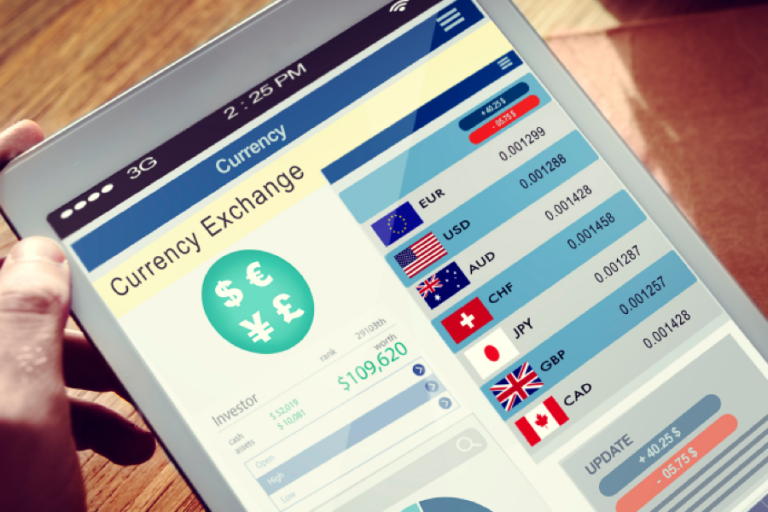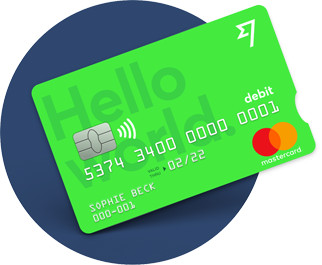The Best Way to Make a Business Transfer Overseas
Banks and international money transfer providers can be incredibly useful for your business transfers. Find out what to look for and how to get the best money transfer rates with low or no fees.

What to look for when making international money transfers for business
The best way to make a business international money transfer for paying international invoices or overseas employees or contractors might not necessarily be with your bank. Many small to medium-sized companies are now looking at different payment solutions to make their money transfers cheaper and work for their business. If you're also looking for a better solution for your company, there are 6 things to consider:
- Transfer amount - under $1,000 there are plenty of money transfer companies competing for your business. For larger amounts of money, it's best to find a provider with a higher limit
- Frequency - for regular payments some companies offer special deals and the ability to make automatic recurring transfers
- Location - payments to major countries and currencies are covered by most money transfer services. Other countries may require extra research
- How you make your transfers - online is always cheaper than making a transfer in-person. When you're on-the-go using a mobile app is best, so finding a provider with a good app might be valuable
- Foreign exchange products - you might need a range of products to manage your currency risk. For example, you might want to lock in the exchange rate when you pay your New Zealand contractor in NZD from your Australian dollar account
- Support needs - you might need a personal account manager to handle your transactions or at the very least, 24/7 online support

If you're converting your Australian dollars into another currency for your foreign payments you might have even more requirements. Especially if you want to minimise costs and limit your foreign exchange risk. The best way to figure out which international money transfer option is most ideal for your business is to compare banks and specialist companies that offer money transfers.
How to compare banks and other business transfer providers
To compare banks and other international money transfer companies, it's important to look at the key costs and features. Here are the main ones:
- Exchange rates – getting a competitive exchange rate is where you can save the most money on your transfer costs. Banks tend to offer worse exchange rates than international money transfer services
- Fees – banks usually charge fixed fees for international money transfers, but in recent times this fee has been lowered or removed completely. For business accounts, some money transfer specialists remove fixed fees for large amounts or regular transfers
- Card – having a card to pay for online subscriptions or online purchases that does not charge you foreign currency conversions like Revolut or Wise's Borderless Debit Card will be mighty handy for your business
- Foreign currency account – banks usually offer individual foreign currency accounts for businesses. Some banks offer multi-currency accounts. They're great products, but can be expensive. Make sure to check the fees and conversion costs for transferring currencies between each other and look for alternative options
- Transfer options – foreign exchange contracts (FECs or forward contracts), limit orders, and options to manage exchange rate risk. These are products mainly offered by banks
- Solutions for e-commerce – selling goods online requires specific intel for taking payments from international customers. Usually this involves installing a plugin on your website to accept payment which involves more technology than banks have to offer
- Personal account manager advise – tailored advise on how to manage your company's foreign currency risk can be important. However, banks tend to assign currency experts to help get the best exchange rates when you're a medium to large business
Comparison table for Australian banks and specialist money transfer providers
| Account name | ANZ | NAB | TransferWise | Revolut | OFX | WorldFirst | XE | InstaReM | TorFX |
|---|---|---|---|---|---|---|---|---|---|
| Exchange rate | 2-6% margin | 2-6% margin | 0% margin | 0-2% margin | 0.5-2% margin* | 0-0.5% margin | 2-4% margin | 0% margin | 2-4% margin |
| Fees AUD to USD <$1,000 | $9 | $10 | 0.33-3.56% | Standard Plan $0; Premium Plan $10.99/month | $15 | $0 | $0 | 0.25-1.00% | $0 |
| Fees AUD to USD >$10,000 | $0 | $10 | 0.33-3.56% | Standard Plan $0; Premium Plan $10.99/month | $0 | $0 | $0 | 0.25-1.00% | $0 |
| Card | |||||||||
| Foreign or multi currency account | |||||||||
| Market/limit orders | |||||||||
| Foreign exchange forward contracts | |||||||||
| Foreign exchange derivative (options) | |||||||||
| API Integration | |||||||||
| eCommerce/online merchant solutions | |||||||||
| Personal account manager & advise |
*Fees and charges in AUD. Updated October, 2019
Looking for the Best International Money Transfer Services for Business?
Still don't know which international money transfer specialist to go with? Let us help you.
Here's our take on the 5 best money transfer services for business, including a quick snapshot for each company
1. Best Foreign Currency Account: Wise
2. Best for online sellers: OFX
3. Fee-free for large amounts: WorldFirst
4. Great exchange rates: InstaReM
5. Customer service: XE money transfers
Looking for the Best Foreign Currency Account?

Wise (formerly known as TransferWise) offer a multi currency account in Australia, called the Borderless Account. It's easy to set-up, receive and send foreign currency. The fee structure is better than any of the banks listed.
The thing that makes it different is that it allows you to up a local bank account in AUD, GBP, EUR, NZD or USD. That means if you open up a USD account, you’ll have your own ABA and account number (think BSB and account number). Having your own local bank account makes it significantly easier, faster and cheaper to receive money.
Wise now offer a debit card with your Borderless account for business travel overseas. This means you can spend like a local, too and not worry about annoying exchange rate conversions or extra ATM fees.
Read our full Wise Borderless Account review here
- It’s very fast and easy to create an account
- Their service charge is low, fees and pricing are transparent
- You can pay via bank transfer, credit or debit card
- There’s no minimum transfer size
- Can't pay for your transfer via cash or cheque
- Limited customer support, interact by email or online support
- If you’re transferring over $40,000, their percentage-based fee can make them less competitive
What's the Best Money Transfer Provider for Online Sellers?
OFX is an Australian based money transfer company. They are particularly good at reducing the cost of international payments for online sellers.
What makes OFX stand out from the rest of the competition is it's 24/7 telephone support service - perfect for online merchants transacting all day and night.
They also have a great resource hub for online sellers with plenty of helpful articles.
- Integration with Xero accounting software
- Lock in exchange rates using forward exchange contract
- Better exchange rates for larger amounts
- Licensed to give foreign currency risk management advise
- OFX Global Currency Account for online sellers
- They’re not as competitive if you’re sending less than $2,000
- Minimum transfer amount of $250
- You can’t pay for your transfer using cash, credit card or a cheque
Fee Free Transfer?
There's a lot to like about the services that WorldFirst offer. WorldFirst don’t charge any fees for making an international money transfer no matter the amount.
Recently WorldFirst lowered their exchange rate margins to just 0.5% or less for transfers, which certainly puts it ahead of the banks for cheap transfers.
- Better exchange rates for larger amounts
- Local currency account
- Dedicated account manager and personal FX advise
- Foreign currency receiving accounts for online sellers
- They’re not as competitive if you’re sending less than $2,000
- You can’t pay for your transfer using cash, credit card or a cheque
- Calculator on their homepage doesn't quote the actual rate you would get for your transfer
Companies with Great Exchange Rates
InstaReM operates globally. With competitive exchange rates and fast turnaround times, this company can be a solid financial platform for international money transfers for business. Especially for sending money to and from India.
The primary service InstaReM offers for businesses is its MassPay platform. It allows companies to configure how and when payments are disbursed to multiple recipients at once. It's useful for payrolls or to pay for large multinational product orders.
- Their website is quick and easy to use
- API integration for large corporates
- Launching business cards with personalised branding
- Great for smaller amounts of money under $1,000
- FAQs section less comprehensive than other websites
- No currency hedging tools (limit orders, spot/forward contracts)
- Doesn't specialise in personal advisory services
Awesome Customer Service
XE has been around since 1993, so they know a thing or two about business transfers! They provide a wealth of trusted information on exchange rates, including currency price history, news and more.
XE will also help you create a risk management strategy for currency exposures and recommend a hedging plan for your business with a dedicated account manager for business clients. What's not to like?
- XE are a worldwide, trusted authority for currency exchange
- They don’t charge any fees for sending money overseas
- Send international money transfers to over 200 countries
- It’s easy to get in touch with and use their customer service
- Their website is quick and pain-free to use
- You can’t pay for your transfer using cash or a cheque
- No foreign currency accounts
- Exchange rates not as competitive as other money transfer specialists
Should I use a bank for business transfers?
If your business is just starting to send money overseas or receive money in other currencies, banks are worth looking at. Only because it's a good starting point. However, banks may not be cost-effective given the fees that come with it.
Medium to large businesses can also benefit from the whole range of complex hedging products and detailed business reports and research intel a bank can offer.
Banks offer foreign currency accounts that might be suitable for your business needs. However, these are also expensive. You can apply at a branch, but chances are banks will refer you to their business banking or corporate banking department.
Pros and cons of using banks
- Open a foreign currency account and save money on currency conversion fees
- International businesses can bill in foreign currency
- Relationship manager will help you manage exchange rate risk
- Bank fees are high
- Varied bank fees makes it difficult to compare
- Can be difficult to open a business account
When should I use my bank for a business transfer?
There is no magic number at which point banks become useful. If you're making 1 to 2 payments under $1,000 each year, going through your bank for convenience makes it useful. Even if it's still more expensive.
Banks charge high fixed fees and worse exchange rates than you can get from companies like Wise, XE Money Transfer, WorldRemit and similar businesses.
We think it’s vital for you to make a fair comparison though, so we’ve reviewed all of these banks and shared what’s good and bad about each one:
Our FAQs for international money transfers, answered
If you're using your bank it will take between 3-5 business days, and even longer in some cases.
However, delays can occur during this process. Timing can depend on:
- Country where the money is being sent to - public holidays or general banking disruptions (e.g. for payments to the United States)
- How your transfer your money - bank transfer, online transfer, cash transfer or PayPal
- Which money transfer company you use - cash and online money transfer companies are usually faster than banks
- Foreign currency conversion - if the bank doesn't have specific instructions about currency conversions, it can cause delays
- Unavailable funds from your bank account - usually an issue if your sender sets up regular payments and there isn't enough money
- Incorrect details - this might cause delays, cancellation of the transfer, or the money might even be sent to the wrong place
- Security - if the payment doesn't meet company policies about fraud or anti money laundering, especially for larger amounts
Related: How Long Does an International Money Transfer Take?
You'll need the following information to make your international money transfer:
Transfer details
- Amount
- Currency
- Reason for transfer
Your details
- Your name (or person you're sending money on behalf of)
- Account number
- Personal address
Recipient (Overseas) Account details
- Bank's name
- Branch address
- IBAN/SWIFT Code
- Recipient international bank account number
- Recipient account name (full name without initials)
Your money transfer service or bank may request more information about your transfer to meet anti-laundering regulations or internal security policies.
Related: How to transfer money overseas, Is a telegraphic transfer (TT) the best way to transfer money?, What is a wire transfer?
In most cases personal accounts should be used only for individual or personal purposes. However, a lot of people use their personal account for business purposes.
For example, some businesses use their personal credit card to pay for business expenses. This can create issues for your account (or yourself), because you have to separate out your business expenses from your personal expenses. So it might not be worth the hassle of using your personal accounts for business purposes.
Also, money transfer companies and banks tend to offer products and features for businesses that aren't available for personal accounts. Other money transfer companies offer accounts that are perfect for business or individuals like the TransferWise Borderless Account.
Related: The Best Credit Cards for Overseas Use: Business Vs Personal
There are several tools to manage your international money transfers. Here are the main ones:
- Limit orders: A limit order allows you to specify a target exchange rate for your funds transfer, and your provider will then monitor the market and perform your transfer when the rate is hit. This allows small business owners to take advantage of fluctuating exchange rates when sending money overseas.
- Spot rate: Is the immediate foreign exchange rate (takes place on the spot).
- Forward contract: You lock in an exchange rate for an international money transfer that takes place at a later date. Not all providers offer this service and you need to consider how far in advance contracts can be set up and if extra fees are charged.
- Bulk/mass/batch payments: Almost all money transfer services and banks give you the ability to make bulk transfers for international payments. This is convenient for business owners and can help you organise your budget more effectively.
- Scheduled payments: Most money transfer companies and banks will let you schedule your payments. It's best to find a money transfer service or bank that has a simple to use platform via app or on their website for making scheduled payments.
Related: Forward Exchange Contracts, 5 Best Money Transfer Apps
Should I use more than one money transfer provider?
Sometimes. If you find a single provider that works for all of your needs, that’ll be the easiest choice. But if you occasionally send money overseas in exotic or unusual currencies and your regular provider is unable to help, you'll benefit from using a different provider for those one-off transactions.
As your company grows and your international money transfer needs change, it's best to re-evaluate providers. For more tips, tools and information, go to The Essential Guides to Foreign Exchange for Business. You can also head to the Australian government website EFIC. It gives a good run down of these accounts from an exporters point of view.
Related: Receive International Payments
Different money transfer providers offer to transfer funds to a range of different supported currencies and countries.
Most providers will let you send funds in commonly traded currencies, for example the US dollar, British pound and New Zealand dollar. Depending on your business, you may need to transfer funds in more exotic currencies.
Related:
Your currency knowledge centre
5 Cheaper Ways to Transfer Money Overseas
Using a bank is one of the easiest ways of transferring money overseas, but can also be the most costly. There are alternatives that can make the whole process cheaper.
- Read more ⟶
- 2 min read
International Money Transfer Comparison and Reviews
Find the best international money transfer exchange rates to send money overseas from Australia. Compare the rates and fees from leading banks and money transfer services.
- Read more ⟶
- 6 min read
5 Good Alternatives to OFX
While OFX is easy to use, and offer good exchange rates, other companies can do the same. In this article, we take a look at companies that offer similar services to OFX to see how they stack up.
- Read more ⟶
- 2 min read















